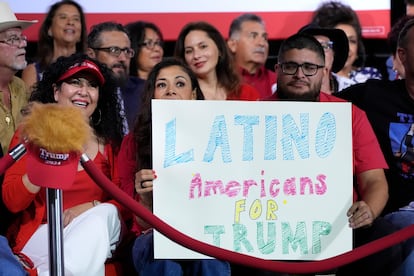Latino organizations dispute election data on Hispanic support for Trump
A survey conducted by multiple organizations shows that 62% of the Latino vote supported Kamala Harris and challenges claims that the Republican candidate was the top choice among Latino men


Major Latino and minority organizations have united to challenge data published since Election Day that suggests the Hispanic electorate was responsible for Donald Trump’s decisive victory. Preliminary figures showed that 53% of Latinos voted for Kamala Harris and 45% for Trump. However, data from Latino groups reveals a significant gap: 62% supported the Democratic candidate, with only 37% backing the Republican.
“There is absolutely no valid or accurate evidence indicating that a majority of Latino men voted for Trump. While Trump did perform better among younger age groups, this trend does not hold for the overall group,” said Matt Barreto, co-founder of BSP Research. His organization, along with other Hispanic groups and the African American Research Collaborative (AARC), conducted a survey of 9,400 voters between October 18 and November 4. This survey underpins the findings of the organizations.
Since November 5, news reports have been claiming that, for the first time, Latino men overwhelmingly supported the Republican Party. Yet, BSP’s survey indicates that 56% of Hispanic men cast their vote for Harris, 13 percentage points higher than those who voted for Trump. Barreto contends that their survey is more reliable due to its larger sample size and multilingual approach.
These organizations also refute claims that the Latino vote was decisive in tipping any state in Trump’s favor, despite the widespread assumptions that Hispanic voters were pivotal in flipping key states.
Latino groups such as UnidosUS, Voto Latino, La Brega y Fuerza Fund, and the Hispanic Federation joined forces with other minority representatives, including Asian Americans Advancing Justice and the AARC, to highlight the flaws in exit polling. They argue these polls often fail to accurately represent minorities, leading to a skewed portrayal of these communities.
“While the data continues to come in, unfortunately headlines get written with imperfect information. We wanted to make sure people had very robust information about Hispanic voters, the majority of whom voted for Vice President Harris in every state except Florida,” said Clarissa Martínez de Castro, vice president of UnidosUS’s Voto Latino Initiative. The survey sampled 3,750 Latinos with a margin of error of ±1.62%.
Although the groups contradict the popular interpretations of the election results, they do acknowledge an undeniable shift: a growing trend of minority support for the Republican Party. “The results of Tuesday’s elections were part of a trend that transcends Latino voters,” said Melissa Morales, president of Somos Votantes. “This is greater than any single demographic. Laying the blame for the loss exclusively on Latino voters is not only irresponsible but dangerous, and feeds into the agenda of division and hate that Donald Trump and his followers feed on.”
The organizations do agree that the economy was the factor that most influenced voters, but argue that there is a lack of understanding for what it means for Latinos. In addition to the fact that the Latino community suffered disproportionately from the Covid-19 pandemic, Morales explained that the economic impact was about more than “the price of eggs.”
“For Latinos, the economy isn’t just the economy. The economy includes the weight of our ancestors who crossed deserts, forged rivers and faced death for the chance of economic opportunity,” she said. “That weight and trauma lives in our DNA and paves the way to choose self-preservation over harm mitigation, which is what we saw on Tuesday.”
What remains clear to these groups is that Latinos do not receive the political attention they deserve. Evidence of this lies in the fact that 45% of respondents said they were never contacted by any political party. This is despite the Latino community making up the largest and fastest-growing minority electorate, with 36.2 million eligible voters. This mobilization was especially visible in the Puerto Rican vote, which surged following Trump’s disparaging remarks at a Madison Square Garden rally, where Puerto Rico was called “a floating island of garbage.”
The BSP survey, also supported by various migrant organizations, highlights the disconnect between Latino policy preferences and the political figures they support, which has led to a decline in support for the Democratic Party. A substantial 79% of Latino voters support abortion rights, and 80% favor a pathway to citizenship for long-term undocumented migrants — positions contrary to Trump’s platform, yet he has still managed to increase his support within the community.
Against deportations
Another contradiction highlighted by migrant advocates is the support Trump received despite his pledge to carry out the largest mass deportation operation in U.S. history, which would predominantly affect Latino communities. Vanessa Cárdenas, executive director of the pro-migrant organization America’s Voice, said: “We know that the American public, even in light of last week’s results, opposes the Trump agenda of mass deportations, and separation of family. American voters overall choose legal status for long settled undocumented immigrants over deportation.”
The poll also reflects a pervasive fear of increasing hate and racism across the nation. Sixty percent of respondents expressed concern that elected officials remain silent and fail to denounce white nationalists and extremists who incite hatred and attacks on minorities and immigrants. In recent days, Trump has signaled the direction of his immigration policy by appointing hardline officials, such as South Dakota Governor Kristi Noem, Tom Homan, and Stephen Miller — the latter two being key architects of the family separation policy during his previous administration.
Sign up for our weekly newsletter to get more English-language news coverage from EL PAÍS USA Edition
Tu suscripción se está usando en otro dispositivo
¿Quieres añadir otro usuario a tu suscripción?
Si continúas leyendo en este dispositivo, no se podrá leer en el otro.
FlechaTu suscripción se está usando en otro dispositivo y solo puedes acceder a EL PAÍS desde un dispositivo a la vez.
Si quieres compartir tu cuenta, cambia tu suscripción a la modalidad Premium, así podrás añadir otro usuario. Cada uno accederá con su propia cuenta de email, lo que os permitirá personalizar vuestra experiencia en EL PAÍS.
¿Tienes una suscripción de empresa? Accede aquí para contratar más cuentas.
En el caso de no saber quién está usando tu cuenta, te recomendamos cambiar tu contraseña aquí.
Si decides continuar compartiendo tu cuenta, este mensaje se mostrará en tu dispositivo y en el de la otra persona que está usando tu cuenta de forma indefinida, afectando a tu experiencia de lectura. Puedes consultar aquí los términos y condiciones de la suscripción digital.








































